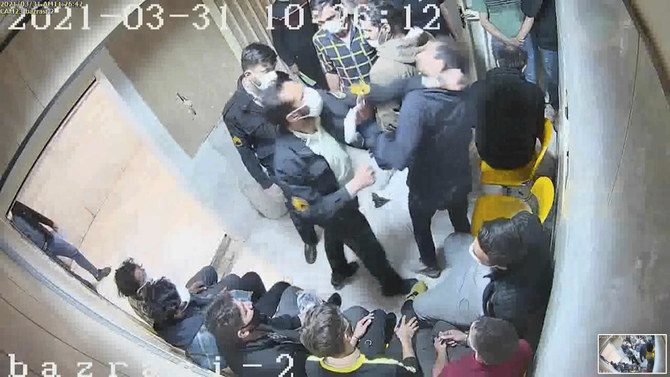DUBAI: The head of Iran’s prison system acknowledged Tuesday that videos purportedly obtained by a self-described hacker group that show abuses at the Islamic Republic’s notorious Evin prison are real, saying he took responsibility for the “unacceptable behaviors.”
The comment by Mohammad Mehdi Hajjmohammadi came the day after parts of the videos and a report were published about the abuse at the facility in northern Tehran, long known for holding political prisoners and those with ties to the West whom Iran uses as bargaining chips in international negotiations.
Writing on Twitter, Hajjmohammadi vowed to “avoid the repeat of such bitter incidents as well as confront the perpetrators.”
“My apologies to the Almighty God, the dear Supreme Leader, our great nation and the noble prison officers whose efforts will not be ignored because of the wrongdoings” of others, he wrote.
State television in Iran also reported Hajjmohammadi’s remarks.
Hajjmohammadi, however, offered no plan on how to address the abuses at Evin. Since its construction in 1971 under Iran’s shah, the prison has seen a series of abuses that continued into the Islamic Republic.
After Iran cracked down on protesters following the disputed 2009 re-election of hard-line President Mahmoud Ahmadinejad, many of the arrested protesters ended up in Evin. Lawmakers later pushed for reforms at Evin, following reports of abuses at the prison — which led to the installation of the closed-circuit cameras.
In one part of the footage, a man smashes a bathroom mirror to try to cut open his arm. Prisoners — and even guards — beat each other in scenes captured by surveillance cameras. Inmates sleeping in single rooms with bunk beds stacked three high against the walls, wrapping themselves in blankets to stay warm.
Four former prisoners at Evin, as well as an Iranian human rights activist abroad, said that the videos resemble areas from the facility in northern Tehran. Some of the scenes also matched photographs of the facility previously taken by journalists, as well as images of the prison as seen in satellite photos accessed by the AP.
An online account that shared the videos calls itself “The Justice of Ali,” a reference to the Prophet Muhammad’s son-in-law who is revered by Shiites. It also mocks Iran’s Supreme Leader Ali Khamenei. However, the account did not respond to AP questions about its membership or how it conducted the hack.


Iran official acknowledges videos of Evin prison abuse real
Short Url
https://arab.news/b7p79
Iran official acknowledges videos of Evin prison abuse real

- Facility in northern Tehran long known for holding political prisoners
- Former prisoners at Evin said that the videos resemble areas from the prison
Iran and Russia to conduct navy drill on Thursday, Fars news reports

- The drills are set to occur a few days after the Revolutionary Guards conducted military drills in the Strait of Hormuz
DUBAI, Feb 18 : Iran and Russia will conduct navy drills in the Sea of Oman and the northern Indian Ocean on Thursday, the Iranian semi-official Fars news agency reported, a few days after Revolutionary Guards conducted military drills in the Strait of Hormuz.
“Creating convergence and coordination in joint measures to counter activities threatening maritime security and safety (...) as well as combating maritime terrorism, are among the main goals of this joint exercise,” an Iranian navy commander, Hassan Maghsoodloo said according to Fars news.
“Creating convergence and coordination in joint measures to counter activities threatening maritime security and safety (...) as well as combating maritime terrorism, are among the main goals of this joint exercise,” an Iranian navy commander, Hassan Maghsoodloo said according to Fars news.
© 2026 SAUDI RESEARCH & PUBLISHING COMPANY, All Rights Reserved And subject to Terms of Use Agreement.












